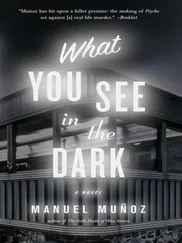Ted Chiang - Liking What You See - A Documentary
Здесь есть возможность читать онлайн «Ted Chiang - Liking What You See - A Documentary» весь текст электронной книги совершенно бесплатно (целиком полную версию без сокращений). В некоторых случаях можно слушать аудио, скачать через торрент в формате fb2 и присутствует краткое содержание. Жанр: Фантастика и фэнтези, на английском языке. Описание произведения, (предисловие) а так же отзывы посетителей доступны на портале библиотеки ЛибКат.
- Название:Liking What You See: A Documentary
- Автор:
- Жанр:
- Год:неизвестен
- ISBN:нет данных
- Рейтинг книги:4 / 5. Голосов: 1
-
Избранное:Добавить в избранное
- Отзывы:
-
Ваша оценка:
- 80
- 1
- 2
- 3
- 4
- 5
Liking What You See: A Documentary: краткое содержание, описание и аннотация
Предлагаем к чтению аннотацию, описание, краткое содержание или предисловие (зависит от того, что написал сам автор книги «Liking What You See: A Documentary»). Если вы не нашли необходимую информацию о книге — напишите в комментариях, мы постараемся отыскать её.
Liking What You See: A Documentary — читать онлайн бесплатно полную книгу (весь текст) целиком
Ниже представлен текст книги, разбитый по страницам. Система сохранения места последней прочитанной страницы, позволяет с удобством читать онлайн бесплатно книгу «Liking What You See: A Documentary», без необходимости каждый раз заново искать на чём Вы остановились. Поставьте закладку, и сможете в любой момент перейти на страницу, на которой закончили чтение.
Интервал:
Закладка:
The files were sent by the SemioTech Warriors, a culture-jamming group responsible for many numerous of media vandalism.
When contacted about this story, Wyatt/Hayes issued a statement decrying this violation of their internal computer systems.
Jeff Winthrop:
Yes, it’s true, Wyatt/Hayes paid me, but it wasn’t an endorsement deal; they never told mewhat to say. They just made it possible for me to devote more time to the anti-calli campaign, which is what I would’ve done anyway if I hadn’t needed to make money tutoring. All I’ve been doing is expressing my honest opinion: I think calli’s a bad idea.
A couple of people in the anti-calli campaign have asked that I not speak publicly about the issue anymore, because they think it would hurt the cause. I’m sorry they feel that way, because this is just anad hominem attack. If you thought my arguments made sense before, this shouldn’t change anything. But I realize that some people can’t make those distinctions, and I’ll do what’s best for the cause.
Maria deSouza:
Those students really should have registered their affiliations; we all know people who are walking endorsements. But now, whenever someone criticizes the initiative, people ask them if they’re being paid. The backlash is definitely hurting the anti-calli campaign.
I consider it a compliment that someone is taking enough interest in the initiative to hire a PR firm. We’ve always hoped that its passing might influence people at other schools, and this means that corporations are thinking the same thing.
We’ve invited the president of the National Calliagnosia Association to speak on campus. Before we weren’t sure if we wanted to bring the national group in, because they have a different emphasis than we do; they’re more focused on the media uses of beauty, while here at SEE we’re more interested in the social equality issue. But given the way students reacted to what Wyatt/Hayes did, it’s clear that the media manipulation issue has the power to get us where we need to go. Our best shot at getting the initiative passed is to take advantage of the anger against advertisers. The social equality will follow afterwards.
From the speech given at Pembleton by Walter Lambert, president of the National Calliagnosia Association:
Think of cocaine. In its natural form, as coca leaves, it’s appealing, but not to an extent that it usually becomes a problem. But refine it, purify it, and you get a compound that hits your pleasure receptors with an unnatural intensity. That’s when it becomes addictive.
Beauty has undergone a similar process, thanks to advertisers. Evolution gave us a circuit that responds to good looks—call it the pleasure receptor for our visual cortex—and in our natural environment, it was useful to have. But take a person with one-in-a-million skin and bone structure, add professional makeup and retouching, and you’re no longer looking at beauty in its natural form. You’ve got pharmaceutical-grade beauty, the cocaine of good looks.
Biologists call this “supernormal stimulus”; show a mother bird a giant plastic egg, and she’ll incubate it instead of her own real eggs. Madison Avenue has saturated our environment with this kind of stimuli, this visual drug. Our beauty receptors receive more stimulation than they were evolved to handle; we’re seeing more beauty in one day than our ancestors did in a lifetime. And the result is that beauty is slowly ruining our lives.
How? The way any drug becomes a problem: by interfering with our relationships with other people. We become dissatisfied with the way ordinary people look because they can’t compare to supermodels. Two-dimensional images are bad enough, but now with spex, advertisers can put a supermodel right in front of you, making eye contact. Software companies offer goddesses who’ll remind you of your appointments. We’ve all heard about men who prefer virtual girlfriends over actual ones, but they’re not the only ones who’ve been affected. The more time any of us spend with gorgeous digital apparitions around, the more our relationships with real human beings are going to suffer.
We can’t avoid these images and still live in the modern world. And that means we can’t kick this habit, because beauty is a drug you can’t abstain from unless you literally keep your eyes closed all the time.
Until now. Now you can get another set of eyelids, one that blocks out this drug, but still lets you see. And that’s calliagnosia. Some people call it excessive, but I call it just enough. Technology is being used to manipulate us through our emotional reactions, so it’s only fair that we use it to protect ourselves too.
Right now you have an opportunity to make an enormous impact. The Pembleton student body has always been at the vanguard of every progressive movement; what you decide here will set an example for students across the country. By passing this initiative, by adopting calliagnosia, you’ll be sending a message to advertisers that young people are no longer willing to be manipulated.
From a broadcast of EduNews:
Following NCA president Walter Lambert’s speech, polls show that 54% of Pembleton students support the calliagnosia initiative. Polls across the country show that an average of 28% of students would support a similar initiative at their school, an increase of 8% in the past month.
Tamera Lyons:
I thought he went overboard with that cocaine analogy. Do you know anyone who steals stuff and sells it so he can get his fix of advertising?
But I guess he has a point about how good-looking people are in commercials versus in real life. It’s not that they look better than people in real life, but they look good in a different way.
Like, I was at the campus store the other today, and I needed to check my e-mail, and when I put on my spex I saw this poster running a commercial. It was for some shampoo, Jouissance I think. I’d seen it before, but it was different without calli. The model was so—I couldn’t take my eyes off her. I don’t mean I felt the same as that time I saw the good-looking guy in the cafeteria; it wasn’t like I wanted to get to know her. It was more like watching a sunset, or a fireworks display.
I just stood there and watched the commercial like five times, just so I could look at her some more. I didn’t think a human being could look so, you know, spectacular.
But it’s not like I’m going to quit talking to people so I can watch commercials through my spex all the time. Watching them is very intense, but it’s a totally different experience than looking at a real person. And it’s not even like I immediately want to go out and buy everything they’re selling, either. I’m not even really paying attention to the products. I just think they’re amazing to watch.
Maria deSouza:
If I’d met Tamera earlier, I might have tried to persuade her not to get her calli turned off. I doubt I would’ve succeeded; she seems pretty firm about her decision. Even so, she’s a great example of the benefits of calli. You can’t help but notice it when you talk to her. For example, at one point I was saying how lucky she was, and she said, “Because I’m beautiful?” And she was being totally sincere! Like she was talking about her height. Can you imagine a woman without calli saying that?
Tamera is completely unself-conscious about her looks; she’s not vain or insecure, and she can describe herself as beautiful without embarrassment. I gather that she’s very pretty, and with a lot of women who look like that, I can see something in their manner, a hint of showoffishness. Tamera doesn’t have that. Or else they display false modesty, which is also easy to tell, but Tamera doesn’t do that either, because she trulyis modest. There’s no way she could be like that if she hadn’t been raised with calli. I just hope she stays that way.
Читать дальшеИнтервал:
Закладка:
Похожие книги на «Liking What You See: A Documentary»
Представляем Вашему вниманию похожие книги на «Liking What You See: A Documentary» списком для выбора. Мы отобрали схожую по названию и смыслу литературу в надежде предоставить читателям больше вариантов отыскать новые, интересные, ещё непрочитанные произведения.
Обсуждение, отзывы о книге «Liking What You See: A Documentary» и просто собственные мнения читателей. Оставьте ваши комментарии, напишите, что Вы думаете о произведении, его смысле или главных героях. Укажите что конкретно понравилось, а что нет, и почему Вы так считаете.











